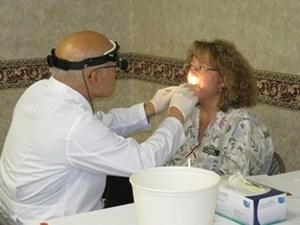FAQ: What are some examples of relaxation exercises that will help my throat?

FAQ: What are some examples of relaxation exercises that will help my throat?
- posted: Oct. 18, 2023
Just like the rest of our bodies, our voice also needs to rest.
Below are some tips for relaxing your voice from our Relaxation Pamphlet.
- Sit in a straight chair without arms with both feet on the floor. Arms should hang loosely at your sides. Dangle your arms shaking any tension from your arms, hands, and fingers so they are limp – like a rag doll. Very gradually and smoothly, tighten and then release the grip in your hands. Do this five times.
- At any point during your relaxation session you may find it helpful to think about a situation you might be in or a person you might be with in which you would feel very safe, secure and relaxed. Do some thinking about your ‘safest place’ or person. Close your eyes and imagine you are in that situation. Revisit that situation as you relax. They range from listening to waves coming in on the beach to being in the presence of a spiritual individual. As you practice, and spend time with this activity you will get better and better. Very often, your stressed or relaxed reaction does not depend on the situation you are in, but your ‘perception’ of that situation. As you relax in this way, you restructure the situation more appropriately to your advantage. And as you use these more relaxed styles and postures, you actually choose a more relaxed lifestyle.
- Now you are ready to practice a ‘low impact’, low energy way of talking. If you use this voicing technique, it will reduce the high impact muscle stress on your vocal folds as you speak. More specifically, it will keep the vocal folds from coming together too tightly. This is critical because during high impact voicing the vocal folds smash together. This results in blisters or calluses on the edges of the folds. This style of voicing may also result in fatigue of the voice muscles. The quality of your voice is finally affected. The voicing style you learned in # Seven is fine for private practice times but won’t work for your regular talking without making a change. Here’s the change. During all your social and business talking use a voice which is (1) low volume, (2) breathy or whispery and (3) loose and relaxed. Use everything you did in # Seven except the slurred speech. This will help your tired and/or damaged vocal muscles recover by reducing the muscle ‘energy’. It may also be used to reduce or avoid vocal fatigue.
- As you practice all these activities you will notice that some are more effective for you than others. Choose those activities and do them more frequently than the others. Most of the activities are designed to be done for very short periods of time as well as a part of a longer relaxation session. So, do them for 15 seconds or a minute when you are driving your car, shopping, or at work. It may also be helpful for you to keep a simple record of when the activities are done. So carry a small pad with you and write down the practice times.
If you are experiencing any problems with your voice, schedule a consultation with one of our ear specialists by calling 407-644-4883 or click here to schedule your appointment request.

FAQ: What are some examples of relaxation exercises that will help my throat?
- posted: Oct. 18, 2023
Just like the rest of our bodies, our voice also needs to rest.
Below are some tips for relaxing your voice from our Relaxation Pamphlet.
- Sit in a straight chair without arms with both feet on the floor. Arms should hang loosely at your sides. Dangle your arms shaking any tension from your arms, hands, and fingers so they are limp – like a rag doll. Very gradually and smoothly, tighten and then release the grip in your hands. Do this five times.
- At any point during your relaxation session you may find it helpful to think about a situation you might be in or a person you might be with in which you would feel very safe, secure and relaxed. Do some thinking about your ‘safest place’ or person. Close your eyes and imagine you are in that situation. Revisit that situation as you relax. They range from listening to waves coming in on the beach to being in the presence of a spiritual individual. As you practice, and spend time with this activity you will get better and better. Very often, your stressed or relaxed reaction does not depend on the situation you are in, but your ‘perception’ of that situation. As you relax in this way, you restructure the situation more appropriately to your advantage. And as you use these more relaxed styles and postures, you actually choose a more relaxed lifestyle.
- Now you are ready to practice a ‘low impact’, low energy way of talking. If you use this voicing technique, it will reduce the high impact muscle stress on your vocal folds as you speak. More specifically, it will keep the vocal folds from coming together too tightly. This is critical because during high impact voicing the vocal folds smash together. This results in blisters or calluses on the edges of the folds. This style of voicing may also result in fatigue of the voice muscles. The quality of your voice is finally affected. The voicing style you learned in # Seven is fine for private practice times but won’t work for your regular talking without making a change. Here’s the change. During all your social and business talking use a voice which is (1) low volume, (2) breathy or whispery and (3) loose and relaxed. Use everything you did in # Seven except the slurred speech. This will help your tired and/or damaged vocal muscles recover by reducing the muscle ‘energy’. It may also be used to reduce or avoid vocal fatigue.
- As you practice all these activities you will notice that some are more effective for you than others. Choose those activities and do them more frequently than the others. Most of the activities are designed to be done for very short periods of time as well as a part of a longer relaxation session. So, do them for 15 seconds or a minute when you are driving your car, shopping, or at work. It may also be helpful for you to keep a simple record of when the activities are done. So carry a small pad with you and write down the practice times.
If you are experiencing any problems with your voice, schedule a consultation with one of our ear specialists by calling 407-644-4883 or click here to schedule your appointment request.
Ear, Nose, Throat and Plastic Surgery Associates, PA
Winter Park
133 Benmore Drive, Suite 100,
Winter Park, FL 32792
Altamonte Springs
107 The Hermits Trail,
Altamonte Springs, FL 32701
Celebration
400 Celebration Place, Suite A120,
Celebration, FL 34747
Contact Us
Office Hours
Monday
8:00 am - 5:00 pm
Tuesday
8:00 am - 5:00 pm
Wednesday
8:00 am - 5:00 pm
Thursday
8:00 am - 5:00 pm
Friday
8:00 am - 5:00 pm
Saturday
8:00 am - 12:00 pm
Sunday
Closed

